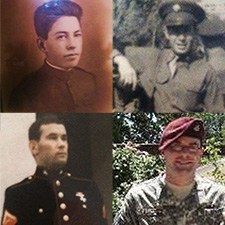Every year thousands of Americans serve their country in the armed forces and eventually return home to discover a society that expects these same men and women to heal the mental and emotional scars developed during combat without disrupting the fabric of society.
The high number of veterans that return home to ultimately find themselves caught in the gears of the judicial system is a topic that hits particularly close to home. You see, four generations of my family have served our country in the armed forces. My great grandpa – Demetrio Sanchez – served in WWI. My grandpa – Bernal Sanchez – served in WWII. My father – Daniel Sanchez – served in Vietnam. My brother – Andrew Sanchez – is presently stationed in Washington and served in Afghanistan.
The harsh reality is that American veterans are having a difficult time readjusting to civilian life. According to The Economist: “Unemployment among veterans who have served since 2001 is higher than for non-veterans. Veterans make up 20% of all suicides. Nearly a fifth of the homeless population are veterans, and substance abuse is pervasive.” Additionally, an estimated one in five veterans of the current war show signs of mental health issues. A 2008 study revealed that almost 20% of Irag and Afghanistan veterans reported symptoms of PTSD or major depression. VA studies also illustrate that PTSD victims typically exhibit more aggressive behavior than non-sufferers, a fact that can lead to criminal behavior.
In response to the growing epidemic an alternative to traditional court – Veteran Courts – have emerged across the country as a form of therapeutic and collaborative justice, providing substance abuse and mental health treatment to returning veterans in lieu of traditional incarceration.
The first veteran’s court opened in Buffalo, New York in 2008. In Veteran’s Court substance abuse and/or mental health treatments are offered as an alternative to incarceration, and veteran mentors assist returning veterans with the difficult transition from combat to civilian life. Upon successful completion the offender can ultimately walk away with a clean criminal record.
VETERAN’S COURT IN SECOND JUDICIAL DISTRICT COURT
In New Mexico the Second Judicial District Court in Bernalillo opened its own Veteran’s Court in November, 2011, partnering with several agencies and organizations in N.M. that are committed to providing support services for veterans. Our Veteran’s Court focuses on addressing the needs of military veterans who face a number of challenges specifically related to service trauma and as a result have found themselves involved in the criminal justice system.
The primary focus of the New Mexico Veteran’s Court is to hold veterans accountable for their actions, while providing veterans that are suffering from substance abuse, alcoholism and mental-health issues with access to essential support services and treatment.
REQUIREMENTS
Candidates must meet the following requirements to be considered for the program: (1) Have served in the United States Military, (2) Have a trauma disorder and substance abuse disorder, (3) Be competent to stand trial, (4) Voluntarily participate in the program, (5) Comply with supervision mandates and directives of the assigned Veterans Court supervising officer, (6) Follow the outlined treatment program, (7) Submit to random drug and alcohol screening, (8) Comply with the Veterans Court agreement.
WHO IS DISQUALIFIED FROM VETERAN’S COURT IN NEW MEXICO?
In addition to the requirements above, potential candidates must be charged with the following criminal offenses: (1) 3rd or 4th degree felonies, as well as some nonviolent 2nd degree felonies, (2) Felony DWI, Controlled Substance Offenses and any other 3rd or 4th degree felony charges.
Lastly, the following criminal charges disqualify potential candidates from acceptance into the program: (1) Violent crimes that result in death or permanent injury and sexual offenses are excluded from eligibility, (2) Intentional child abuse resulting in death or permanent injury are excluded from eligibility.
John F. Kennedy once said: “. . . ask not what your country can do for you — ask what you can do for your country.” It’s time for Americans to ask what we can do for those that have already risked everything for their country.








